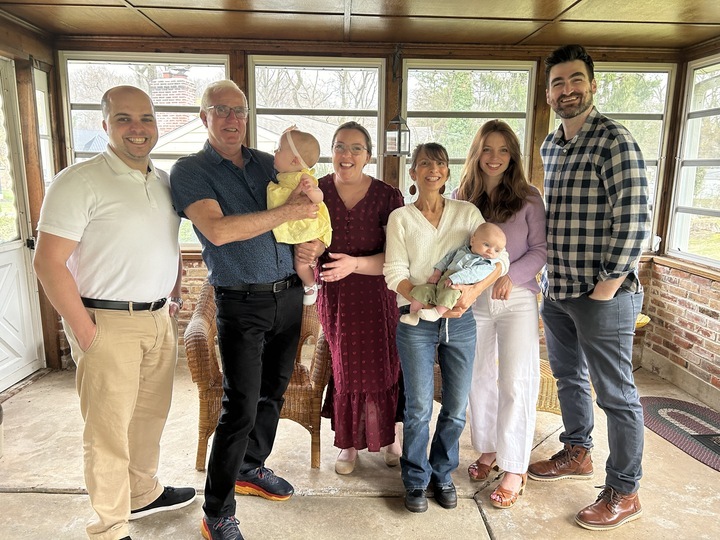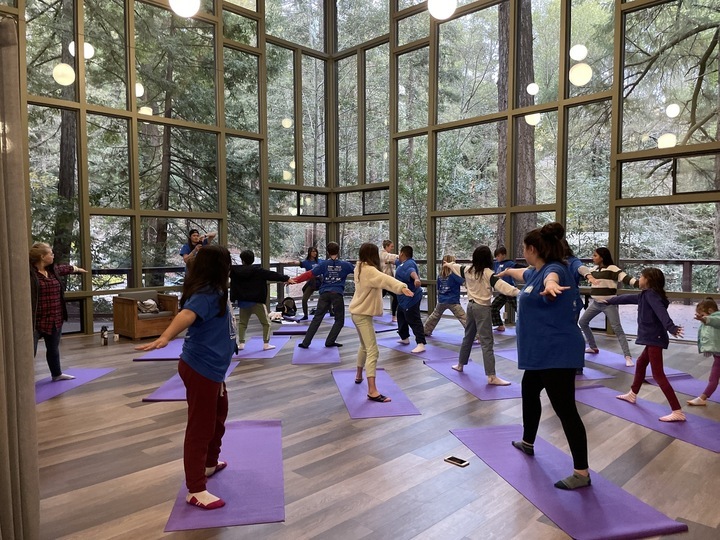ALS community offers hope, support, and friendship for families
Last updated Aug. 20, 2025, by Mary Chapman

Jodi O’Donnell-Ames is pictured surrounded by family, from left: son-in-law Jared Nespoli, husband Warren Benton Ames holding grandchild Quinn Nespoli, daughter Nora Nespoli, Jodi O’Donnell-Ames holding grandchild Ronan Powers, daughter Alina O’Donnell, and son-in-law Don Powers. (Courtesy of Jodi O’Donnell-Ames)
When Jodi O’Donnell-Ames’ first husband Kevin O’Donnell died of complications of amyotrophic lateral sclerosis (ALS) at age 35 in 2001, she received 401 sympathy cards. While the outpouring of support was comforting, O’Donnell-Ames couldn’t help but notice that only one note mentioned Alina, the couple’s young daughter.
“That was very telling to me,” says O’Donnell-Ames, who 11 years later founded an ALS nonprofit that helps children and young adults navigate grief, find joy, and stay hopeful. “People don’t realize that an 8 year old can be very astute as to what’s going on.”
One issue may be that children don’t always talk about the things they may see and hear.
“Just because children don’t say anything doesn’t mean they don’t understand,” O’Donnell-Ames says. “They get clues from body language, tears, all kinds of things. I recognized that this was a kind of unmet need.”
About two years later, O’Donnell-Ames was once again in need of something that didn’t seem to exist. She had just married Warren Benton Ames, who had lost his wife Tina to ALS. O’Donnell-Ames searched for grief programs and activities for her daughter and Ames’ two young children — whom she calls her “bonus children” — but couldn’t find anything.
Creating community for ALS families
She decided she’d solve this problem herself. It took time, but in 2012, Hope Loves Company (HLC), based in Pennington, New Jersey, was launched. HLC offers support, resources, and community for children and young adults affected by ALS through camps and other programming.
“It was a lot of work,” says O’Donnell-Ames, an author, speaker, and ALS advocate who won the 2025 Brian Wallach and Sandra Abrevaya Trailblazer Award from the nonprofit I AM ALS. “It was the result of a lot of energy, love, and assistance.”
HLC’s first program — a Family Fun Day — was an “extremely small” event, with 10 children and eight adults, O’Donnell-Ames recalls. There wasn’t any budget, and it was entirely run by volunteers.
Later, O’Donnell-Ames added a curriculum that incorporated break-out sessions on various topics. She was also able to hire a musician and art teacher.

A yoga class at Camp HLC welcomes all ages. (Courtesy of Hope Loves Company)
Camp with a difference
That event eventually became what is now known as Camp HLC — free three-day retreats for people ages 6 to 21 in various regions across the country. The program is featured in HLC’s short film Together is Better.
O’Donnell-Ames and her team carefully assess potential sites, making sure they can easily accommodate mobility aids, adaptive devices, and support equipment.
The organization’s signature program offers a mix of traditional camp activities with support and resources for kids to help them learn about coping with stress and the trauma of living with, or losing, a loved one with ALS. Staff includes social workers, teachers, and child life experts.
Family members, including those with ALS, can attend the camps, as do caregivers. Typically, there are about 100 participants at each camp, many of them returnees. Some participants attend multiple camps throughout the year, forging lasting friendships with others who understand what they’re going through.
Jeff Gurney, who was diagnosed with bulbar-onset ALS in 2021, lives in Las Vegas with his wife and two sons, ages 11 and 13. Upon the suggestion of the ALS Association of Nevada, he and his family attended their first Camp HLC that year in the Santa Cruz Mountains in California. Since then, they’ve attended three other camps.
“Kids often get overlooked because of the stress and everything, and it’s nice for them to not have to tell people what ALS is,” says Gurney, 52, who owns a nonprofit licensed investigation service. “Everybody there gets it. Everybody knows what the deal is.”
The camaraderie the camps foster is invaluable, he says: “My boys have fun every year. A lot of these kids are so excited to see each other, they almost knock each other down.”
Giving back year-round
This year, HLC is offering five camps, each made possible by sponsorships and donations. A virtual camp, as well as one in Fairview Lake, New Jersey, took place earlier this year. There are two camps at the end of August: one in Colebrook, Connecticut, and the other in Winder, Georgia. The final camp of 2025 is in late November in Riverside County, California.
Some of the other programs HLC offers include monthly virtual hangouts for children and young adults, on-demand educational video series, and monthly virtual meetups for parents.
HLC has been a labor of love for O’Donnell-Ames, who says she still sometimes gets emotional about what she’s been through.
“But it’s tougher for the kids who are brave enough to attend our program and love someone with ALS, than for me to have sad days,” she says. “It’s very rewarding but also challenging to see so many young children who love someone with a terminal illness, seeing what the whole family is going through, and just wanting to do more.”
ALS News Today is strictly a news and information website about the disease. It does not provide medical advice, diagnosis, or treatment. This content is not intended to be a substitute for professional medical advice, diagnosis, or treatment. Always seek the advice of your physician or other qualified health provider with any questions you may have regarding a medical condition. Never disregard professional medical advice or delay in seeking it because of something you have read on this website.
Recent Posts
- ‘Early birds’ have significantly lower ALS risk than ‘night owls’: Study
- As my late husband’s ALS progressed, we kept our bucket list simple
- Tossing and turning over fears this ALS journey has come to its end
- Experimental ALS therapy QRL-201 shows potential to slow disease decline
- Worried about an inability to multitask? Here’s what helped me.